Periodontology.
Periodontics, or periodontology, is a branch of dentistry that focuses on the study of periodontal tissues and structures supporting and sorrounding teeth: these structures, known as periodontium, are gingiva (gums), cementum, alveolar bones and periodontal ligaments or membranes. Periodontal is a word that originates from ancient greek and literally means ‘around the tooth’.
Periodontal treatment. The areas in which it operates.
Periodontics deals with the study of periodontal tissues and of the inflammatory disease that destroys the gums and other supporting structures around the teeth. A periodontist is a dentist who specializes in the prevention, diagnosis, and treatment of periodontal disease and in the placement of dental implants. Periodontists receive a training in these areas, including three additional years of education beyond dental school. They also study cosmetic periodontal procedures.
Periodontal diseases are the main object of study of this specialty, along with the periodontal treatments and operations; periodontists can also perform surgical procedures for patients with severe gum disease.
Periodontal diseases are principally caused by accumulation and proliferation of bacterial plaque around teeth and gums, that combined with other factors may lead to periodontitis or distruction of bones and tissues around the teeth. Factors of risk are lack of oral hygiene and negligence, genetic predisposition, reduction of immune system, hormonal changes, medications, diseases as diabetes or cancer and medical treatments.
Usually if gums become red or painful, there is a bad taste in the mouth or bad breath, or there is blood during brushing or flossing, gums may be inflamed and there may be a gingivitis; in these cases is ever recommended to go to the dentist as soon as possible, as this kind of states can be easily reversed with simple and cheap precautions. If a gum inflammation is not treated it will turn into periodontitis, a more severe pathology that can provoke erosion of the gums, loss of tooth or of bones.
Periodontics. The solutions offered.
Periodontics offer different answers to these problems and different treatments, such as scaling and root planing, to clean the infected root surfaces, root surface debridement, to remove damaged tissue and regenerative procedures that invert corrosion of bones and tissues. Periodontists are trained in the placement, maintenance and repair of dental implants, surgical components inserted in the bone of the jaw or skull to support dental prosthesis such as a crown, bridge, denture, facial prosthesis or to act as an orthodontic anchor.





